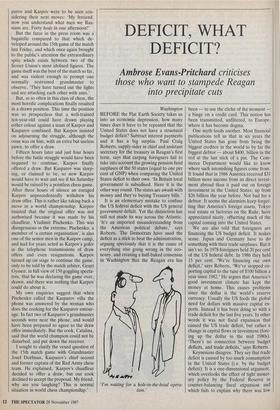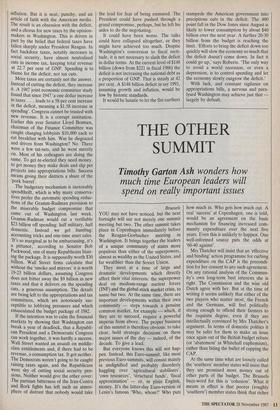DEFICIT, WHAT DEFICIT?
Ambrose Evans-Pritchard criticises those who want to stampede Reagan into precipitate cuts
Washington BEFORE the Flat Earth Society takes us into an economic depression, how many times does it have to be repeated that the United States does not have a structural budget deficit? Subtract interest payments and it has a big surplus. Paul Craig Roberts, supply-sider in chief and assistant secretary for the treasury in Reagan's first term, says that carping foreigners fail to take into account the growing pension fund surpluses of the 50 states (equal to one per cent of GNP) when comparing the United States deficit to their own. 'In Britain local government is subsidised. Here it is the other way round. The states are awash with money and they're buying Treasury bills.'
It is an elementary mistake to confuse the US federal deficit with the US general government deficit. Yet the distinction has still not made its way across the Atlantic. 'It's an imported misunderstanding from the American political debate,' says Roberts. The Democrats have used the deficit as a stick to beat the administration, arguing speciously that it is the cause of everything else going wrong in the eco- nomy, and creating a half-baked consensus in Washington that the Reagan era has 'I'm waiting for a hole-in-the-head opera- been — to use the cliché of the moment — a binge on a credit card. This notion has been transmitted, unfiltered, to Europe, where it has become dogma.
One myth feeds another. Most financial publications tell us that in six years the United States has gone from being the biggest creditor in the world to by far the biggest debtor — about $400, billion in the red at the last stick of a pin. The Com- merce Department would like to know where such astonishing figures come from. It found that in 1986 America received $31 billion more income from its direct invest- ment abroad than it paid out on foreign investment in the United States; up from $26 billion the year before. Not bad for a debtor. It seems the alarmists keep forget- ting that America's foreign assets, Tokyo real estate or factories on the Ruhr, have appreciated nicely, offsetting much of the capital coming into the United States.
We are also told that foreigners are financing the US budget deficit. It makes sense. Japan and Germany have to do something with their trade surpluses. But it ain't so. In 1978 foreigners held 20 per cent of the US federal debt. In 1986 they held 15 per cent. 'We're financing our own deficit,' says Roberts, 'We've stopped ex- porting capital to the tune of $100 billion a year since 1982.' He argues that America's good investment climate has kept the money at home. This causes problems since the dollar is the world's reserve currency. Usually the US feeds the global need for dollars with massive capital ex- ports. Instead it has been doing so with a trade deficit for the last five years. In other words it was not fiscal expansion that caused the US trade deficit, but rather a change in capital flows or investment (forc- ing up the dollar in the mid 1980s). 'There's no connection between budget deficits, and trade deficits,' says Roberts.
Keynesians disagree. They say that trade deficit is caused by too much consumption in the United States (i.e. by the budget deficit). It is a one-dimensional argument, which overlooks the effect of tight monet- ary policy by the Federal Reserve in counter-balancing fiscal expansion and which fails to explain why there was low inflation. But it is neat, punchy, and an article of faith with the American media. The result is an obsession with the deficit, and a chorus for new taxes by the opinion- makers in Washington. This is driven in part by the belief that federal taxes have fallen sharply under President Reagan. In fact backdoor taxes, notably increases in social security, have almost neutralised cuts in income tax, keeping total revenue at 22.7 per cent of GNP. Spending is to blame for the deficit, not tax cuts.
More taxes are certainly not the answer. Instead of cutting the deficit, they increase it. A 1987 joint economic committee study found that since 1947 'a one dollar increase in taxes . . . leads to a 58 per cent increase in the deficit, meaning a $1.58 increase in spending'. Congress cannot be trusted with new revenue. It is a corrupt institution. Earlier this year Senator Lloyd Bentsen, chairman of the Finance Committee was caught charging lobbyists $10,000 each to eat breakfast with him. Was he disgraced and driven from Washington? No. There were a few tut-tuts, and he went merrily on. Most of his colleagues are doing the same. To get re-elected they need money. to get money they make deals and slip pet projects into appropriations bills. Success means giving their districts a share of the 'pork barrel'.
The budgetary mechanism is inexorably spendthrift, which is why many conserva- tives prefer the automatic spending reduc- tions of the Gramm-Rudman provision to the miserable budget compromise that came out of Washington last week. Gramm-Rudman would cut a verifiable $23 billion off spending: half military, half domestic. Instead we get humbug: accounting tricks and one-time asset sales. It's so marginal as to be embarrassing, it's a pittance,' according to Senator Bob Packwood, one of many Republicans blast- ing the package. It is supposedly worth $30 billion. Wall Street firms calculate that Without the 'smoke and mirrors' it is worth 19-23 billion dollars, assuming Congress does not fritter away the $9 billion in new taxes and that it delivers on the spending cuts, a generous assumption. The details are being left to the appropriations and tax committees, which are notoriously sus- ceptible to lobbying pressures and which emasculated the budget package of 1982.
If the intention was to calm the financial markets by showing that Washington can break a year of deadlock, that a Republi- can President and a Democratic Congress can work together, it was hardly a success. Wall Street wanted an assault on middle- class entitlements and, if there had to be revenue, a consumption tax. It got neither. The Democrats weren't going to be caught raising taxes again, and the Republicans were shy of cutting social security pen- sions. Neither would give the other cover. The partisan bitterness of the Iran-Contra and Bork fights has left such an atmos- phere of distrust that nobody would take the lead for fear of being ensnared. The President could have pushed through a grand compromise, perhaps, but he left his aides to do the negotiating.
It could have been worse. The talks could have collapsed altogether, or they might have achieved too much. Despite Washington's conversion to fiscal recti- tude, it is not necessary to slash the deficit in dollar terms. At the current level of $148 billion (down from $221 in fiscal 1986) the deficit is notincreasing the national debt as a proportion of GNP. That is steady at 42 per cent. A $148 billion.deficit in say 1993, assuming growth and inflation, would be low by historic standards. It would be lunatic to let the flat earthers stampede the American government into precipitous cuts in the deficit. The 800 point fall in the Dow Jones since August is likely to lower consumption by about $40 billion over the next year. A further 20-30 billion from the budget is reaching the limit. 'Efforts to bring the deficit down too quickly will slow the economy so much that the deficit doesn't come down. In fact it could go up,' says Roberts. 'The only way to avoid a world recession, or even a depression, is to control spending and let the economy slowly outgrow the deficit.'
With luck, and constant vigilance on appropriations bills, a nervous and para- lysed Washington may achieve just that — largely by default.



































































 Previous page
Previous page